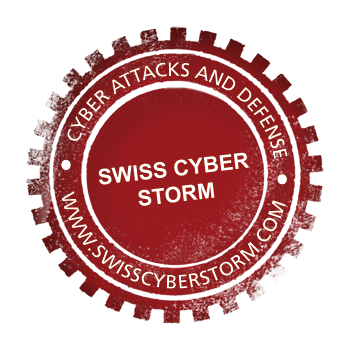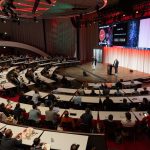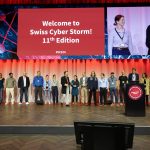Time for the Swiss Cyber Storm 2022 feedback report
We have been sending out the same feedback survey for several years now. This allows to get some consistency in reporting and allows for an internal discussion on a sound base. This is vital, since people tend to tell us they loved the conference, but then they vote with their feet and we do not see them at future editions anymore.
The other key to decent feedback is to send out the survey immediately after the conference. We’ve managed to do so again and landed 40 responses which is a sample size of more than 10% of the audience.
Overall impression of the Swiss Cyber Storm conference
This is the first question, also meant to break the ice. It’s a multiple-choice question and we stick to the same wording every year. This gives us some baseline of the quality of the event:
59 % (2021: 64 %): It was a very interesting and cool event, keep it up and I’ll be there next year
36 % (32 %): It was quite good – I consider attending next year
5 % (4 %): It was ok, but I probably won’t be there again
0 % (0 %): Bad, I won’t be there again
We are seeing a slight reduction on the top level, but that’s of little significance, namely because the 2021 edition was quite clearly a fan audience. The 2022 audience was bigger, and the numbers are more realistic. What we usually do is grouping the answers and looking at them through the years. This is what we are getting:
2022: 95 % positive / 5 % negative
2021: 96 % positive / 4 % negative
2020: no conference
2019: 91 % positive / 9 % negative
2018: 91 % positive / 9 % negative
2017: 89 % positive / 11 % negative
There is clearly an uptrend and I doubt we can get any higher: We have found a winning setup.
Contributing to the winning setup was also the food or more generally the catering. Getting the food right is surprisingly difficult, but after years of troubles, there’s no big problems in this area anymore.
Average speaker rating
We are asking our audience to rate all the speakers individually. We are not sharing that information in public for obvious reasons but we’re open to recommend speakers to other conferences (just get in touch with us). What we also do, though, is to calculate the average or mean speaker rating which gives us a pretty good idea of the quality of the work of the program committee.
The rating goes from 1 – bad to 2 – average and 3 – good to 4 – very good.
Our speakers did good again coming in at 3.19 without the sponsor talks. We see an upward trend here as well:
2022: 3.19
2021: 3.34 (again, quite obviously a fanboy audience)
2020: no conference
2019: 3.04
2018: 3.04
2017: 2.96
An interesting observation is that the 2017 speakers felt like a smashing success. But we have raised the average rating from the audience quite a bit during the years and while I think we had great speakers across the board in 2022, I do not think that the 2017 speakers have been worse in retrospect.
One possible interpretation is that the audience has changed slightly and slowly caught up with the shifted character of the conference. Swiss Cyber Storm used to have more technical talks and replaced some of them with presentations with a more holistic approach.
I do not want to dive into the “why” here but we can use this as an explanation why the 2017 audience rated the speakers lower than this year: The audience back then was expecting a bit more tech talks.
All these shifts are apparently slight, but I think they show in the average numbers.
The focus theme “Digital Identities and How to Secure Them”
92 % of the audience welcomed our focus theme (“Good choice”), 5 % was not very thrilled with the choice (with 3 % ignoring the theme).
How did we perform in the “good choice” category throughout the years?
2022: 92 % (“Digital Identities and How to Secure Them”)
2021: 88 % (“Securing the Supply Chain”)
2020: no conference (but it would have been “E-Health”)
2019: 83 % (“Embracing the Hackers”)
2018: 78 % (“Trust”)
2017: 67 % (“E-Voting”, but not very prominent)
Again, a clear upward trend, now reaching a height that is hard to interpret outside the idea about the shift in the audience.
Where did you hear about Swiss Cyber Storm
This is a question that tells us about our marketing.
58 % (2021: 64 %) I’ve attended before
16 % (24 %): colleagues
15 % (0 %): via communication by a sponsor
8 % (0 %): online articles in the media or blogs
3 % (4 %): via a partner organization (InsomniHack, SATW, Area41, etc.)
0 % (8%): social media
These numbers vary quite wildly from year to year, but it’s pretty clear that we have a returning audience. Furthermore, our leverage to get more people to the conference is via sponsors and colleagues of people who have attended before. We’ve never been very good with social media and partner organizations and online articles did not contribute much most of the years.
Did you like the Raffle?
The raffle is a way to get the audience to engage with the sponsors. You’ll find a detailed explanation here.
33 %: Yes, that was fun
43 %: neutral
13 %: What raffle?
11 %: other, mostly negative
The share of people who enjoy the raffle is coming down vs those who ignore it or do not want to be bothered. It has been coming down a few years now despite the great prizes. Given we used to advertise the raffle more on stage, I double down on the paradoxical interpretation of last year: The less we talk about the raffle, the more people are annoyed with it. The not so obvious reaction would be to either find something new, or to give the raffle a more prominent position in the program. We’ll see.
Freeform Feedback
We fumbled the survey for this question unfortunately. It was simply missing. This is a pity since we always get some very uplifting feedback in this free text part of the survey. And it allows our audience to point the finger at mishaps that we might have overlooked ourselves.
Summary
All in all, we are happy with the positive rating from our audience. It’s now so high, that it’s very hard to optimize even further, and we have to make sure we are not getting complacent. Keeping up the quality is hard.
Looking forward to see you all at Swiss Cyber Storm 2023, the prime national conference that sets the Swiss infosec agenda.
Christian Folini, program chair





